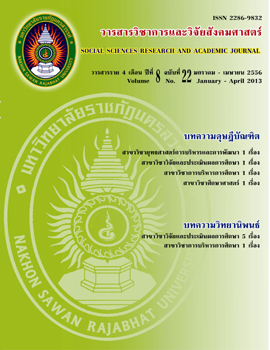การวิเคราะห์สหสัมพันธ์คาโนนิคอลระหว่างจิตวิทยาศาสตร์กับทักษะกระบวนการ ทางวิทยาศาสตร์ของนักเรียนระดับชั้นมัธยมศึกษาตอนปลาย ในสถานศึกษา สังกัดสำนักงานเขตพื้นที่การศึกษามัธยมศึกษาเขต 39
Main Article Content
Abstract
บทคัดย่อ
การวิจัยนี้มีวัตถุประสงค์ เพื่อศึกษาความสัมพันธ์ระหว่างจิตวิทยาศาสตร์กับทักษะกระบวนการทางวิทยาศาสตร์ของนักเรียนระดับชั้นมัธยมศึกษาตอนปลาย สังกัดสำนักงานเขตพื้นที่การศึกษามัธยมศึกษา เขต 39 กลุ่มตัวอย่าง ได้แก่ นักเรียนชั้นมัธยมศึกษาตอนปลาย ที่กำลังศึกษาอยู่ในภาคเรียนที่ 2 ปีการศึกษา 2553 สังกัดสำนักงานเขตพื้นที่การศึกษามัธยมศึกษาเขต 39 ในจังหวัดพิษณุโลกและจังหวัดอุตรดิตถ์ รวม 1,000 คน ได้มาโดยการสุ่มแบบหลายขั้นตอน เครื่องมือที่ใช้ในการวิจัย คือแบบทดสอบวัดทักษะกระบวนการทางวิทยาศาสตร์ เป็นแบบเลือกตอบ 4 ตัวเลือก จํานวน 49 ข้อ และแบบวัดจิตวิทยาศาสตร์ เป็นแบบมาตรตราส่วนประมาณค่า 5 ระดับ จำนวน 63 ข้อ วิเคราะห์ข้อมูลโดยใช้ค่าเฉลี่ย ส่วนเบี่ยงเบนมาตรฐาน สหสัมพันธ์เพียร์สัน และสหสัมพันธ์คาโนนิคอล
ผลการวิจัยพบว่า
นักเรียนมีจิตวิทยาศาสตร์ในภาพรวมอยู่ในระดับปานกลาง เมื่อพิจารณาแต่ละองค์ประกอบของจิตวิทยาศาสตร์ พบว่า มีคะแนนเฉลี่ยตั้งแต่ 3.01 ถึง 3.64 โดยองค์ประกอบของจิตวิทยาศาสตร์ ที่มีคะแนนเฉลี่ยสูงที่สุด คือ ความรับผิดชอบ และองค์ประกอบของจิตวิทยาศาสตร์ที่มีคะแนนเฉลี่ยต่ำที่สุด คือ การมีความคิดเชิงวิพากษ์วิจารณ์ นักเรียนมีทักษะกระบวนการทางวิทยาศาสตร์ในภาพรวมอยู่ในระดับ ผ่านเกณฑ์ขั้นต่ำ เมื่อพิจารณาแต่ละทักษะพบว่ามีคะแนนเฉลี่ยตั้งแต่ 0.45 ถึง 0.65 โดยทักษะกระบวนการทางวิทยาศาสตร์ที่มีคะแนนเฉลี่ยสูงที่สุด คือทักษะการวัด และทักษะกระบวนการทางวิทยาศาสตร์ที่มีคะแนนเฉลี่ยต่ำที่สุด คือ ทักษะการจำแนกประเภท เมื่อวิเคราะห์หาความสัมพันธ์คาโนนิคอลระหว่างจิตวิทยาศาสตร์กับทักษะกระบวนการทางวิทยาศาสตร์ พบว่าสหสัมพันธ์คาโนนิคอลระหว่างชุดตัวแปรต้นจิตวิทยาศาสตร์ทั้ง 11 ด้าน กับชุดตัวแปรตามทักษะกระบวนการทางวิทยาศาสตร์ ทั้ง 13 ทักษะ มีจำนวน 11 ฟังก์ชัน ซึ่งพบว่าทั้ง 11 ฟังก์ชัน ไม่มีนัยสำคัญทางสถิติ แสดงว่าจิตวิทยาศาสตร์กับทักษะกระบวนการทางวิทยาศาสตร์ไม่สัมพันธ์กัน
Abstract
This research aimed to study the relationship between scientific mind and scientific process skills of upper secondary students in schools under the affiliation of the Secondary Educational Service Area Office 39. The sample group, derived from multi-stage random sampling, was 1,000 high school students studying in the second semester of the academic year 2011, in Phitsanulok Province and Uttaradit Province from 13 schools under the supervision of the Secondary Educational Service Area Office 39. The research instruments consisted of the following: first, a test of scientific process skills containing 49 four-multiple-choice items. Second, a scientific mind test contained 63 five-level rating scale items. The data was analyzed using the statistical mean, standard deviation, correlation coefficients and canonical correlation.
Overall, the mean score from the data analysis of the scientific mind test was at amiddle level. The mean scores of each element of the scientific mind ranged from 3.01 to 3.64, with the highest mean score of the scientific mind elements at “responsibility” and the lowest at “critical thinking”. Overall, the mean score of the scientific process skills test passed the criteria. The mean scores of each skill ranged from 0.45 to 0.65, with the highest mean score of the scientific process skills at “skill for measurement” and the lowest at “skill for classification”. The canonical correlations were analyzed between the 11 independent variables of the scientific mind elements and 13 dependent variables of the scientific process skills into 11 functions. It was found that all of the 11 functions did not have any statistically significant correlations.


